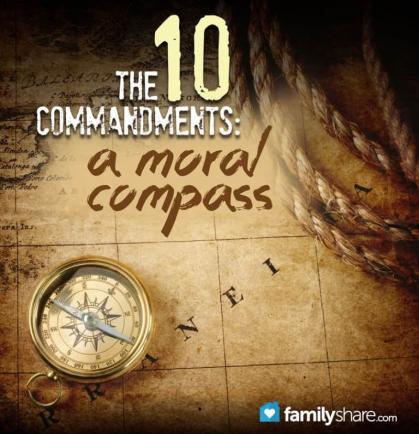
I don't take trips far from home anymore without a GPS. How did I ever navigate without one? "Take exit 251 in two miles. Turn right, here. Your destination is near." Or, if I make a wrong turn, a kind voice reassures me, "Recalculating route," and I find my way back.
A GPS has generally replaced the compass of days past. A compass was also an essential tool for travelers forging new territory long ago. It pointed the way to go. It was an absolute.
There are moral absolutes, like a compass, that point the way to happiness and peace in life. The Ten Commandments are one of those immutable, unchanging guides that map our daily path. They speak to the most basic moral standards of a civilized society. How are we doing as families and communities in obeying these? A religious leader, L. Tom Perry, shared his insight:
"One way to measure ourselves and compare us to previous generations is by one of the oldest standards known to man - the Ten Commandments. For much of the civilized world, particularly the Judeo-Christian world, the Ten Commandments have been the most accepted and enduring delineation between good and evil. In my judgment, four of the Ten Commandments are taken as seriously today as ever. As a culture, we disdain and condemn murder, stealing, and lying, and we still believe in the responsibility of children to their parents. But as a larger society, we routinely dismiss the other six commandments:
-
If worldly priorities are any indication, we certainly have 'other gods' we put before the true God.
-
We make idols of celebrities, of lifestyles, of wealth, and yes, sometimes of graven images or objects.
-
We use the name of God in all kinds of profane ways, including our exclamations and our swearing.
-
We use the Sabbath day for our biggest games, our most serious recreation, our heaviest shopping, and virtually everything else but worship.
-
We treat sexual relations outside marriage as recreation and entertainment.
-
And coveting has become a far too common way of life." (See Exodus 20:3-17.)
After a serious review, we might find we have strayed from the direct course set by one of these commandments. If so, we should attune ourselves to the kind voice inside our head that directs, "Recalculating route," to find our way back. A course evaluation and correction can and should be a daily exercise.
Each family should review regularly the ethical standards they have accepted as their compass. As children freely demonstrate a commitment to a moral lifestyle, parents have a powerful opportunity to recognize and support their children's efforts. Frequent, open conversations about personal standards between family members lays the foundation for clear directions.
My daughter was guided by her moral compass at work one day. She overpaid a customer $5 in change but did not realize it until after he had left. At first, she felt she needed to pay the business back for her mistake so her till would be balanced at closing. Then she rationalized that it was just an oversight - an honest mistake - and the owner wouldn't fault her for that. It wasn't as though she was intentionally stealing. Surely he wouldn't expect her to pay him back out of her own pocket.
As her compass wavered, she felt the impression to begin recalculating. She realized that being honest and the commandment, "Thou shalt not steal," addresses sins of omission as well as commission. She took $5 out of her wallet and put it in the till.
Moments later, my daughter received a phone call from a family she babysat for a few weeks earlier. They told her they had underpaid her by $5 and wanted to come by and give her the money. It was a complete surprise to her.
When she came home from work that night, she told me what had happened. I gave her my warmest praise, words of love and enthusiasm, and encouraged her to write this experience down in her journal to solidify her standards. I wanted her to recognize the connection between making good choices and receiving good in return.
Parents have an opportunity to fix a moral compass within each member of the family by doing the following:
-
Commit to following a set of ethical standards within the family.
-
Review each basic tenant regularly and discuss practical application.
-
When children show allegiance to a specific standard in daily life, recognize, praise and record these experiences for personal strength and support.
-
Attune yourself to the inner voice that guides us in a course correction when necessary.
Unlike the compass of old, the Ten Commandments are not antiquated. They still have immense value as a moral GPS for the modern age.

